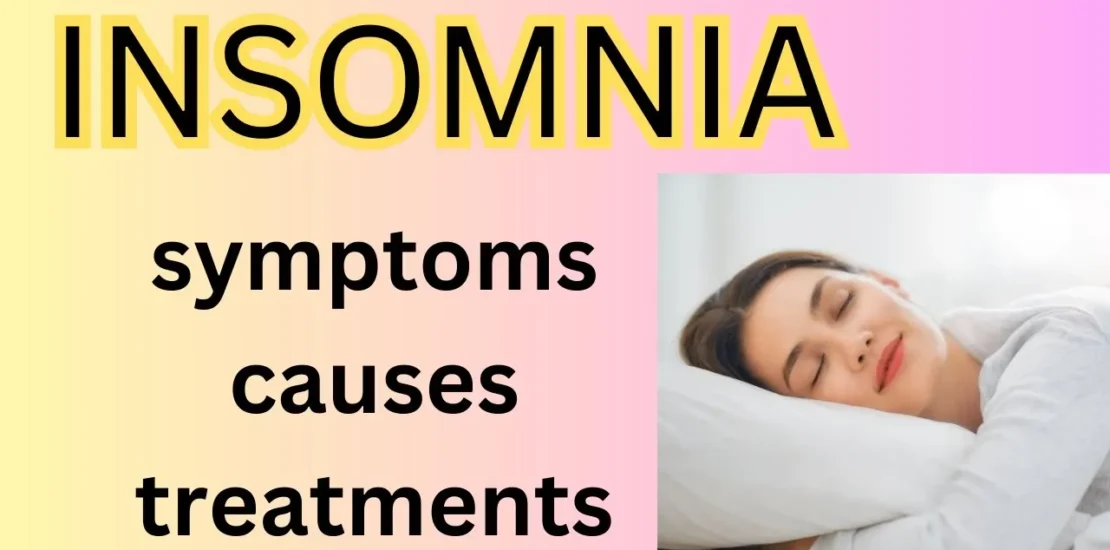- September 21, 2024
- Posted by: Henry Wixdek
- Category: general

Insomnia is a common sleep disorder that affects millions of people worldwide, causing difficulty in falling asleep, staying asleep, or waking up too early and being unable to get back to sleep. This condition can have a significant impact on both mental and physical health, leading to fatigue, irritability, and difficulty focusing during the day. Understanding the symptoms, causes, and treatments for insomnia can help individuals identify the issue and find the appropriate solutions.
Insomnia Meaning: What is Insomnia?
Insomnia is defined as a sleep disorder that can be either short-term (acute) or long-term (chronic). It is characterised by an inability to sleep or a lack of quality sleep, even when the opportunity to rest is available. For many, insomnia disrupts the natural sleep-wake cycle, leaving them feeling unrested and tired throughout the day. Many Australians experience insomnia, with approximately 35% of adults suffering from insomnia symptoms at some point in their lives.
There are two main types of insomnia:
- Acute Insomnia: This type is short-term and usually results from stress, anxiety, or other temporary factors. Acute insomnia typically lasts for days or weeks.
- Chronic Insomnia: This is a long-term condition where individuals struggle with sleep at least three nights a week for three months or longer. Chronic insomnia can have more severe effects on overall health and well-being.
What Causes Insomnia?
Understanding what causes insomnia is crucial for managing it effectively. There are many potential reasons, and the causes of insomnia often vary from person to person. Some of the most common causes include:
- Stress: Work, school, or personal life stress can trigger insomnia. Stress-related insomnia may be short-term, but long-term stress can lead to chronic sleep issues.
- Poor Sleep Habits: Irregular sleep schedules, screen time before bed, or an uncomfortable sleeping environment can all contribute to sleep problems.
- Mental Health Conditions: Mental health issues like depression and anxiety are linked with sleep disorders, with about three quarters of people with depression experiencing some form of insomnia.
- Medical Conditions: Health issues like chronic pain, asthma, or acid reflux can interrupt sleep. Additionally, certain medications may cause insomnia as a side effect.
- Hormonal Changes: Women may experience insomnia during menstrual cycles, pregnancy, or menopause due to fluctuating hormones.
- Caffeine and Alcohol: Consuming stimulants like caffeine late in the day or relying on alcohol as a sedative can disrupt normal sleep patterns.
- Shift Work: Irregular work hours, especially night shifts, can interfere with the body’s internal clock, making it harder to get proper rest.
Symptoms of Insomnia: Do I Have Insomnia?
If you’re wondering, “Do I have insomnia?” it’s important to recognise the signs and symptoms. Insomnia symptoms can vary, but common indicators include:
- Difficulty falling asleep at night
- Waking up frequently during the night
- Waking up too early in the morning
- Feeling tired even after a full night’s rest
- Daytime fatigue or drowsiness
- Irritability, mood changes, or difficulty concentrating
If these symptoms persist for more than a few weeks, you may be experiencing chronic insomnia. Identifying these signs early on can help in finding appropriate insomnia treatments and solutions.
Causes of Insomnia in Females
Women may be more likely to experience insomnia due to several unique factors:
- Hormonal Changes: Changes in hormones during menstrual cycles, pregnancy, or menopause can lead to difficulty sleeping. These fluctuations can cause discomfort, mood swings, and sleep disturbances.
- Pregnancy Discomfort: During pregnancy, physical discomfort, frequent urination, and anxiety about childbirth can make it harder to get restful sleep.
- Menopause: The onset of menopause often leads to hot flashes, night sweats, and other symptoms that disrupt sleep.
Understanding these specific causes can help address insomnia in females more effectively, ensuring they receive appropriate care and treatment.
How to Treat Insomnia: Exploring Treatment Options
When it comes to treating insomnia, there are several options available, ranging from lifestyle changes to medications. Treatment often depends on the severity and underlying causes of insomnia.
Lifestyle Changes for Insomnia
For those with mild insomnia, making simple adjustments to sleep habits and routines can make a significant difference:
- Establish a Regular Sleep Schedule: Going to bed and waking up at the same time every day, even on weekends, can help regulate your body’s internal clock.
- Create a Relaxing Bedtime Routine: Engage in calming activities before bed, such as reading, meditating, or taking a warm bath.
- Limit Screen Time: Avoid using phones, tablets, or computers at least an hour before bed, as the blue light emitted can interfere with your ability to fall asleep.
- Create a Comfortable Sleep Environment: Ensure that your bedroom is quiet, dark, and at a comfortable temperature. A good-quality mattress and pillows can also enhance sleep quality.
Insomnia Medication
In some cases, lifestyle changes alone may not be enough to treat insomnia, particularly for those with chronic insomnia. Insomnia medication can provide relief and help reset sleep patterns. Some common medications available in Australia include:
Alprazolam Xanax (1 mg, 2 mg): A prescription medication used to treat anxiety, which may also help with insomnia in certain cases.
Belbein Zolpidem (10 mg): A sleep aid commonly prescribed for short-term use to help individuals fall asleep faster.
Bromazepam (3 mg): A sedative medication that can relieve anxiety and assist with sleep.
Diazepam (10 mg): Often used for its calming effects, Diazepam can help with insomnia associated with anxiety or stress.
Zolpidem Ambien (10 mg): Another medication used to treat sleep disorders, allowing individuals to get to sleep faster and stay asleep longer.
Zopiclone (7.5 mg): A popular sleep medication that helps those with sleep maintenance insomnia stay asleep through the night.
It’s important to consult with a healthcare professional before starting any insomnia medication to ensure it’s the right choice for your situation.
How to Beat Insomnia: Natural Remedies
For those looking for natural ways to fix insomnia, several remedies may help:
- Melatonin Supplements: Melatonin is a hormone that regulates sleep-wake cycles. Taking a melatonin supplement before bed may help with sleep maintenance insomnia. However, too much melatonin can sometimes worsen insomnia.
- Herbal Teas: Chamomile, valerian root, and lavender teas are known for their calming properties and may promote better sleep.
- Cognitive Behavioural Therapy (CBT-I): CBT-I is a therapeutic approach that helps individuals change negative thought patterns related to sleep. It’s considered one of the most effective treatments for chronic insomnia.
Can Melatonin Cause Insomnia?
While melatonin is commonly used to treat insomnia, in some cases, taking too much or taking it at the wrong time can actually disrupt sleep. It’s important to use melatonin as directed and consult with a healthcare provider if you’re unsure about the correct dosage.
Conclusion: How to Deal with Insomnia
Insomnia can be a challenging condition to manage, but understanding the causes and recognising the symptoms is the first step toward finding relief. Whether through lifestyle changes, natural remedies, or insomnia medications available in Australia, there are many options to explore. If you’re struggling with chronic insomnia or are unsure how to fix insomnia, consulting with a healthcare professional is essential to develop a personalised treatment plan.
If you’re ready to take control of your sleep and improve your quality of life, Australian Pharmacy offers a range of insomnia treatments and medications. For more information, contact us at (+61) 480 027 921 or email us at [email protected]. Let us help you find the right solution to beat insomnia and enjoy restful nights once again.
Leave a Reply Cancel reply
Insomnia is a common sleep disorder that affects millions of people worldwide, causing difficulty in falling asleep, staying asleep, or waking up too early and being unable to get back to sleep. This condition can have a significant impact on both mental and physical health, leading to fatigue, irritability, and difficulty focusing during the day. Understanding the symptoms, causes, and treatments for insomnia can help individuals identify the issue and find the appropriate solutions.
Insomnia Meaning: What is Insomnia?
Insomnia is defined as a sleep disorder that can be either short-term (acute) or long-term (chronic). It is characterised by an inability to sleep or a lack of quality sleep, even when the opportunity to rest is available. For many, insomnia disrupts the natural sleep-wake cycle, leaving them feeling unrested and tired throughout the day. Many Australians experience insomnia, with approximately 35% of adults suffering from insomnia symptoms at some point in their lives.
There are two main types of insomnia:
- Acute Insomnia: This type is short-term and usually results from stress, anxiety, or other temporary factors. Acute insomnia typically lasts for days or weeks.
- Chronic Insomnia: This is a long-term condition where individuals struggle with sleep at least three nights a week for three months or longer. Chronic insomnia can have more severe effects on overall health and well-being.
What Causes Insomnia?
Understanding what causes insomnia is crucial for managing it effectively. There are many potential reasons, and the causes of insomnia often vary from person to person. Some of the most common causes include:
- Stress: Work, school, or personal life stress can trigger insomnia. Stress-related insomnia may be short-term, but long-term stress can lead to chronic sleep issues.
- Poor Sleep Habits: Irregular sleep schedules, screen time before bed, or an uncomfortable sleeping environment can all contribute to sleep problems.
- Mental Health Conditions: Mental health issues like depression and anxiety are linked with sleep disorders, with about three quarters of people with depression experiencing some form of insomnia.
- Medical Conditions: Health issues like chronic pain, asthma, or acid reflux can interrupt sleep. Additionally, certain medications may cause insomnia as a side effect.
- Hormonal Changes: Women may experience insomnia during menstrual cycles, pregnancy, or menopause due to fluctuating hormones.
- Caffeine and Alcohol: Consuming stimulants like caffeine late in the day or relying on alcohol as a sedative can disrupt normal sleep patterns.
- Shift Work: Irregular work hours, especially night shifts, can interfere with the body’s internal clock, making it harder to get proper rest.
Symptoms of Insomnia: Do I Have Insomnia?
If you’re wondering, “Do I have insomnia?” it’s important to recognise the signs and symptoms. Insomnia symptoms can vary, but common indicators include:
- Difficulty falling asleep at night
- Waking up frequently during the night
- Waking up too early in the morning
- Feeling tired even after a full night’s rest
- Daytime fatigue or drowsiness
- Irritability, mood changes, or difficulty concentrating
If these symptoms persist for more than a few weeks, you may be experiencing chronic insomnia. Identifying these signs early on can help in finding appropriate insomnia treatments and solutions.
Causes of Insomnia in Females
Women may be more likely to experience insomnia due to several unique factors:
- Hormonal Changes: Changes in hormones during menstrual cycles, pregnancy, or menopause can lead to difficulty sleeping. These fluctuations can cause discomfort, mood swings, and sleep disturbances.
- Pregnancy Discomfort: During pregnancy, physical discomfort, frequent urination, and anxiety about childbirth can make it harder to get restful sleep.
- Menopause: The onset of menopause often leads to hot flashes, night sweats, and other symptoms that disrupt sleep.
Understanding these specific causes can help address insomnia in females more effectively, ensuring they receive appropriate care and treatment.
How to Treat Insomnia: Exploring Treatment Options
When it comes to treating insomnia, there are several options available, ranging from lifestyle changes to medications. Treatment often depends on the severity and underlying causes of insomnia.
Lifestyle Changes for Insomnia
For those with mild insomnia, making simple adjustments to sleep habits and routines can make a significant difference:
- Establish a Regular Sleep Schedule: Going to bed and waking up at the same time every day, even on weekends, can help regulate your body’s internal clock.
- Create a Relaxing Bedtime Routine: Engage in calming activities before bed, such as reading, meditating, or taking a warm bath.
- Limit Screen Time: Avoid using phones, tablets, or computers at least an hour before bed, as the blue light emitted can interfere with your ability to fall asleep.
- Create a Comfortable Sleep Environment: Ensure that your bedroom is quiet, dark, and at a comfortable temperature. A good-quality mattress and pillows can also enhance sleep quality.
Insomnia Medication
In some cases, lifestyle changes alone may not be enough to treat insomnia, particularly for those with chronic insomnia. Insomnia medication can provide relief and help reset sleep patterns. Some common medications available in Australia include:
Alprazolam Xanax (1 mg, 2 mg): A prescription medication used to treat anxiety, which may also help with insomnia in certain cases.
Belbein Zolpidem (10 mg): A sleep aid commonly prescribed for short-term use to help individuals fall asleep faster.
Bromazepam (3 mg): A sedative medication that can relieve anxiety and assist with sleep.
Diazepam (10 mg): Often used for its calming effects, Diazepam can help with insomnia associated with anxiety or stress.
Zolpidem Ambien (10 mg): Another medication used to treat sleep disorders, allowing individuals to get to sleep faster and stay asleep longer.
Zopiclone (7.5 mg): A popular sleep medication that helps those with sleep maintenance insomnia stay asleep through the night.
It’s important to consult with a healthcare professional before starting any insomnia medication to ensure it’s the right choice for your situation.
How to Beat Insomnia: Natural Remedies
For those looking for natural ways to fix insomnia, several remedies may help:
- Melatonin Supplements: Melatonin is a hormone that regulates sleep-wake cycles. Taking a melatonin supplement before bed may help with sleep maintenance insomnia. However, too much melatonin can sometimes worsen insomnia.
- Herbal Teas: Chamomile, valerian root, and lavender teas are known for their calming properties and may promote better sleep.
- Cognitive Behavioural Therapy (CBT-I): CBT-I is a therapeutic approach that helps individuals change negative thought patterns related to sleep. It’s considered one of the most effective treatments for chronic insomnia.
Can Melatonin Cause Insomnia?
While melatonin is commonly used to treat insomnia, in some cases, taking too much or taking it at the wrong time can actually disrupt sleep. It’s important to use melatonin as directed and consult with a healthcare provider if you’re unsure about the correct dosage.
Conclusion: How to Deal with Insomnia
Insomnia can be a challenging condition to manage, but understanding the causes and recognising the symptoms is the first step toward finding relief. Whether through lifestyle changes, natural remedies, or insomnia medications available in Australia, there are many options to explore. If you’re struggling with chronic insomnia or are unsure how to fix insomnia, consulting with a healthcare professional is essential to develop a personalised treatment plan.
If you’re ready to take control of your sleep and improve your quality of life, Australian Pharmacy offers a range of insomnia treatments and medications. For more information, contact us at (+61) 480 027 921 or email us at [email protected]. Let us help you find the right solution to beat insomnia and enjoy restful nights once again.

